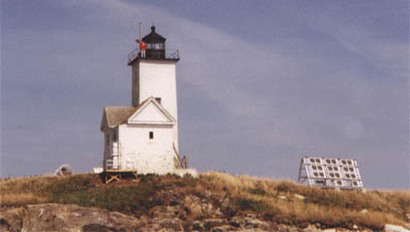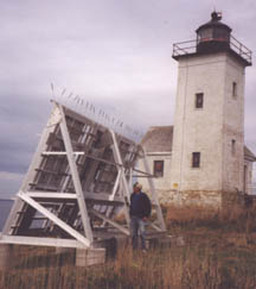History of Two Bush Island Lighthouse, Spruce Head, Maine
© Jeremy D'Entremont. Do not reproduce any images or text from this website without permission of the author.
Established in 1897 to mark the entrance to Two Bush Channel in Penobscot Bay, Two Bush Island Light was an isolated and rough assignment for keepers.
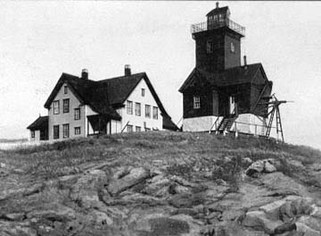
The island was named for two lone bushes or trees, now gone, that served as day beacons before the building of the 42-foot-tall square lighthouse.
The first principal keeper, Altiverd Norton, had a dog that achieved hero status. The dog, Smut, was described as a Newfoundland-shepherd mix. Smut was invaluable companion to the keeper and it was said that he was highly intelligent.
During a storm in March 1902, a fishing schooner, the Clara Bella, was in danger of being smashed on the rocky shores of Two Bush Island. The two men aboard took to a dory as a leak opened up in the schooner.
The men were desperately trying to find a way to land on the island when they heard Smut's frantic barking. The schooner's captain later said that the barking was like music coming from an angel.
The first principal keeper, Altiverd Norton, had a dog that achieved hero status. The dog, Smut, was described as a Newfoundland-shepherd mix. Smut was invaluable companion to the keeper and it was said that he was highly intelligent.
During a storm in March 1902, a fishing schooner, the Clara Bella, was in danger of being smashed on the rocky shores of Two Bush Island. The two men aboard took to a dory as a leak opened up in the schooner.
The men were desperately trying to find a way to land on the island when they heard Smut's frantic barking. The schooner's captain later said that the barking was like music coming from an angel.
Keeper Norton, alerted by the dog, ran to the shore and saw the men in the dory. He tried to guide them to a safe landing, but their boat was overturned by a wave. The keepers managed to get a line to the men and hauled them ashore. Smut eagerly licked the faces of the fishermen, who later offered to buy the dog at any price. The keeper refused to sell.
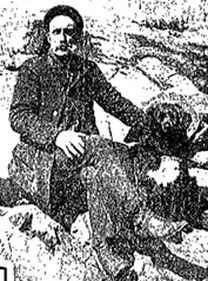
Left: Keeper Altiverd Norton and his dog, Smut.
Leland Mann of nearby Spruce Head came to the station as an assistant keeper in 1919, and he became keeper in 1927. He lived at the lighthouse with his wife, Gertrude, and their son, Darrell. Young Darrell, who was 12 years old when the family arrived on the island, helped with the lighthouse duties. On one occasion, he jumped out of a window of the keeper's house and quickly ran to the top of the lighthouse to put out a fire that had started from the oil vapor.
The four-mile trip from Two Bush Island to the mainland was usually uneventful in summer, but it could be treacherous in winter. There is no protected landing area on the island, so the station's power boat was not kept in the water in winter. Instead, a 14-foot "double-ender" boat with a round bottom was used. This boat could only be launched when the sea was relatively calm, and it had to be hoisted in and out of the water with a winch. The crank for the winch once struck young Darrell Mann in the head, knocking him unconscious. If a keeper was able to make it ashore in winter, he still had a seven mile drive to Rockland for supplies.
Leland Mann of nearby Spruce Head came to the station as an assistant keeper in 1919, and he became keeper in 1927. He lived at the lighthouse with his wife, Gertrude, and their son, Darrell. Young Darrell, who was 12 years old when the family arrived on the island, helped with the lighthouse duties. On one occasion, he jumped out of a window of the keeper's house and quickly ran to the top of the lighthouse to put out a fire that had started from the oil vapor.
The four-mile trip from Two Bush Island to the mainland was usually uneventful in summer, but it could be treacherous in winter. There is no protected landing area on the island, so the station's power boat was not kept in the water in winter. Instead, a 14-foot "double-ender" boat with a round bottom was used. This boat could only be launched when the sea was relatively calm, and it had to be hoisted in and out of the water with a winch. The crank for the winch once struck young Darrell Mann in the head, knocking him unconscious. If a keeper was able to make it ashore in winter, he still had a seven mile drive to Rockland for supplies.
In January 1923 there were 21 snowstorms in the vicinity, and the following month the temperature hit zero for 18 days in a row.
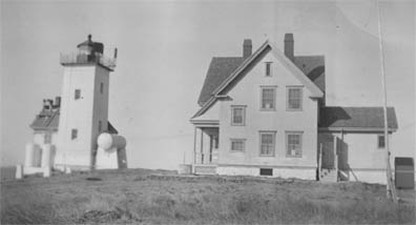
Courtesy of Dave Gamage
A lifesaving crew from Whitehead Island had to smash their dory through the ice to get provisions to Two Bush Island. Darrell Mann later described a winter trip from the island to the mainland during one of the times that much of the bay was frozen over. Darrell and his father, Keeper Leland Mann, enlisted the help of two fishermen. Dressed in hip boots, heavy woolen mittens, heavy wool stockings, oilskins, and wool hoods covering all but their nose, mouth, and eyes, they hauled the double-ender across the ice. When their feet broke through the ice, they would hold on to the sides of the boat for dear life and slide along until they reached solid ice again.
There was too much salt spray on the island to grow vegetables, but the Manns succesfully raised chickens. In 1933, their 24 Barred Rock hens laid 403 eggs. Apparently there was a competition with the keeper's family at Baker Island Light. Darrell Mann told the Rockland Courier-Gazette "If the Baker's Island hens read this, they will double up speed."
There was too much salt spray on the island to grow vegetables, but the Manns succesfully raised chickens. In 1933, their 24 Barred Rock hens laid 403 eggs. Apparently there was a competition with the keeper's family at Baker Island Light. Darrell Mann told the Rockland Courier-Gazette "If the Baker's Island hens read this, they will double up speed."
Keeper Mann's wife died in 1926, and during the same year the keeper fell on the boatslip and broke his hip.
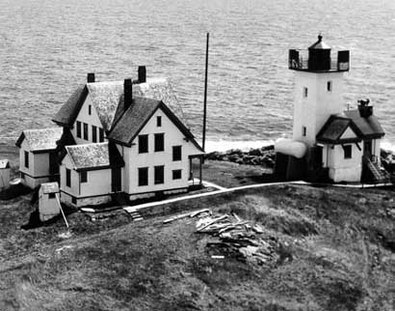
U.S. Coast Guard
There were happy times that year, though, when Darrell Mann married Ruth Duswald of Waldoboro. The morning after their wedding Darrell and Ruth rowed to Two Bush Island in pouring rain. Two years later, the couple had a daughter, June, who reportedly tried to paint the boathouse at the age of three, making a mess of the boathouse and herself. Leland Mann retired in 1933 and three generations of the Mann family left Two Bush Island.
Two Bush Island Light was automated in 1964 and the keepers were removed. For a time, the Coast Guard keepers at nearby Whitehead Light Station operated the Two Bush Island fog signal and monitored the light. "We had an intercom in our engine room so that we could hear Two Bush's compressor running when we turned it on," one of the Coast Guard keepers, Duke D. Glishke, later recalled.
In 1970, the Coast Guard allowed the Green Berets to destroy the keeper's house as a demolition exercise.
The light was converted to solar power in the summer of 2000.
The lighthouse, still an important aid to navigation, now stands alone on the stark island. Under the Maine Lights Program, the lighthouse became the property of the U.S. Fish and Wildlife Service in 1998. The lighthouse can be seen only by boat or from the air.
Two Bush Island Light was automated in 1964 and the keepers were removed. For a time, the Coast Guard keepers at nearby Whitehead Light Station operated the Two Bush Island fog signal and monitored the light. "We had an intercom in our engine room so that we could hear Two Bush's compressor running when we turned it on," one of the Coast Guard keepers, Duke D. Glishke, later recalled.
In 1970, the Coast Guard allowed the Green Berets to destroy the keeper's house as a demolition exercise.
The light was converted to solar power in the summer of 2000.
The lighthouse, still an important aid to navigation, now stands alone on the stark island. Under the Maine Lights Program, the lighthouse became the property of the U.S. Fish and Wildlife Service in 1998. The lighthouse can be seen only by boat or from the air.
Keepers: (This list is a work in progress. If you have any information on the keepers of this lighthouse, I'd love to hear from you. You can email me at [email protected]. Anyone copying this list onto another web site does so at their own risk, as the list is always subject to updates and corrections.)
Alteverd A. Norton (1897-1909); Joseph A. Pruett, assistant (1897-1901); Roscoe L. Dobbin, assistant (1901-1902); William G. Thompson, assistant (1903-1905); Benjamin E. Wakefield, assistant (1906-1908); Lewis W. Dolliver, assistant (1908-1914); Jerome C. Brawne (1909-1912); Leroy S. Elwell (1916-?); Leland Mann (assistant 1919-1927, head keeper 1927-1933); H. Smith (c. 1935); Fred C. Batty (c. 1935)
Alteverd A. Norton (1897-1909); Joseph A. Pruett, assistant (1897-1901); Roscoe L. Dobbin, assistant (1901-1902); William G. Thompson, assistant (1903-1905); Benjamin E. Wakefield, assistant (1906-1908); Lewis W. Dolliver, assistant (1908-1914); Jerome C. Brawne (1909-1912); Leroy S. Elwell (1916-?); Leland Mann (assistant 1919-1927, head keeper 1927-1933); H. Smith (c. 1935); Fred C. Batty (c. 1935)
